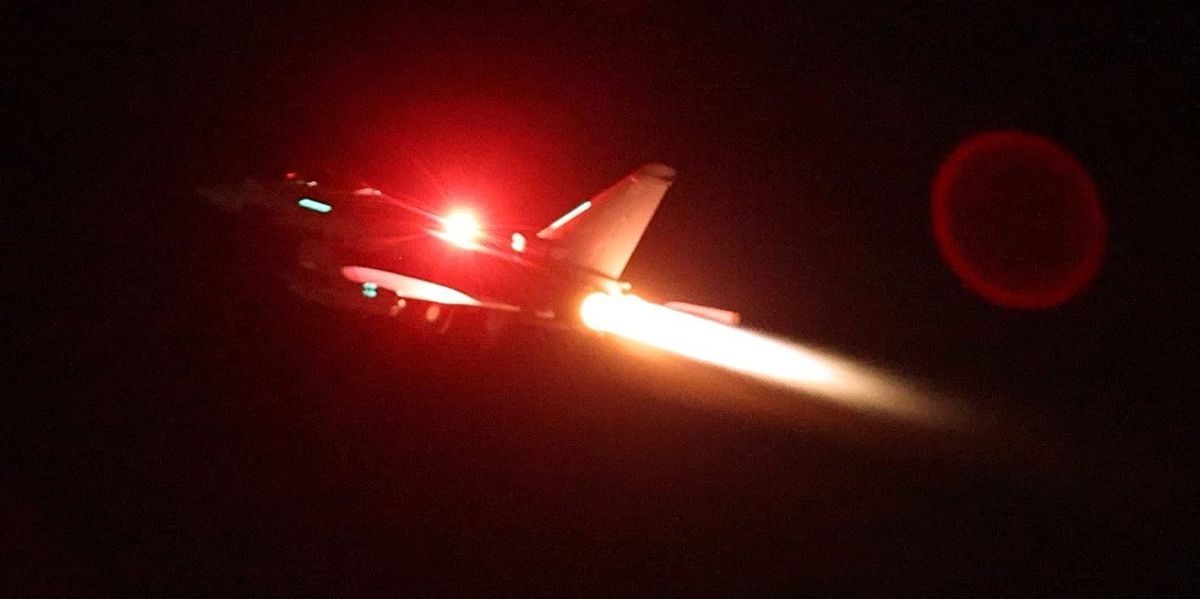Members of Congress from both sides of the aisle Thursday night were lambasting the Biden administration for not getting congressional approval before moving ahead with military strikes against Houthi targets in Yemen.
According to reports, the U.S. and UK launched the strikes via ships, fighter jets, and a submarine Thursday night. Tomahawk missiles reportedly hit the capital of Sana'a, and the governorates of Sa'dah, Hodeidah, Taiz, and Dhamar. Officials told the press that the strikes hit radars, missile- and drone-launch sites, and weapons storage facilities and were not intended to kill leaders or Iranian trainers. The Houthis later said at least five of their fighters had been killed.
“The President needs to come to Congress before launching a strike against the Houthis in Yemen and involving us in another middle east conflict. That is Article I of the Constitution. I will stand up for that regardless of whether a Democrat or Republican is in the White House,” posted California Democratic Rep. Ro Khanna on X, just as news was breaking that the strikes were in progress. Some 30 minutes earlier, there were reports that congressional leaders were given a heads up that the strikes were a go.
“Only Congress has the power to declare war,” posted Kentucky Republican Rep. Thomas Massie. “I have to give credit to @RepRoKhanna here for sticking to his principles, as very few are willing to make this statement while their party is in the White House.”
But several progressive Democrats were already posting their dismay at the news of the strikes.
“@POTUS is violating Article I of the Constitution by carrying out airstrikes in Yemen without congressional approval,” charged Michigan Democrat Rashida Tlaib. “The American people are tired of endless war.” Democratic Reps. Cori Bush, Val Hoyle, Mark Pocan, Barbara Lee, and Pramila Jayapal weighed in similarly as of last tonight.
On the Republican side, Sen. Mike Lee, who has often crossed the aisle on war powers issues, also gave Khanna a boost. “The Constitution matters, regardless of party affiliation.”
"The Constitution is clear, only Congress has the power to declare war. President Biden must come to Congress and ask us to authorize this act of war," posted Florida Republican Rep. Anna Paulina Luna.
She was not enjoined, however, by Republican leadership, which effusively supported Biden's actions. House Speaker Mike Johnson said in a post that "America must always project strength, especially in these dangerous times." Senate Minority Leader Mitch McConnell said, "President Biden's decision to use military force against these Iranian proxies is overdue. I am hopeful these operations mark an enduring shift in the Biden Administration's approach to Iran and its proxies."
In a statement, President Biden said the strikes were in response to three months of Houthi attacks on commercial vessels in the Red Sea. U.S. and UK warships have been thwarting most of the Houthi drones and rockets and have reportedly been the target of such attacks at times too, though the U.S. has incurred no damage or injuries, and no casualties have been reported in any of the cases. The U.S. did retaliate against one attempted hijacking by sinking three Houthi boats and reportedly killing 10 fighters at the end of December.
“These attacks have endangered U.S. personnel, civilian mariners, and our partners, jeopardized trade, and threatened freedom of navigation,” Biden said. “I will not hesitate to direct further measures to protect our people and the free flow of international commerce as necessary.”
The Houthis have said they would continue the attacks until “crimes in Gaza stop and food, medicines and fuel are allowed to reach its besieged population.” The Biden administration, which has not supported a ceasefire in Gaza, said it would hit back hard if the Houthis did not stand down. After a particularly heavy volley of drones and rockets on Tuesday, the administration made its move.
This has a lot of analysts worried about escalation — something the Biden administration said it didn't want. "If the objective is to stop Houthi attacks without escalating matters toward a full war, then bombing them has proven quite inefficient in the past. Just ask the the Saudis," said the Quincy Institute's Trita Parsi, on X, referring to the Yemen civil war in which the Houthis gained major victories despite routine missile bombardments from U.S.-backed Saudi Arabia.
"Moreover, bombing them very likely will escalate matters, which means that not only will the attacks not be stopped, but the broader war that Biden seeks to prevent will likely become a reality."
Meanwhile, governments in the region have begun to respond. Oman, which otherwise has positive relations with Washington, was one of the first out of the gate. The foreign ministry said it viewed the strikes with "deep concern" and said “it is impossible not to denounce that an allied country resorted to this military action, while meanwhile, Israel is continuing to exceed all bounds in its bombardment, brutal war and siege on Gaza without any consequence.”
Story is developing and updated for detail.
- US airstrikes in Iraq and Syria are blatantly unconstitutional ›
- US is barreling toward another war in the Middle East ›
- Houthi missile launches at Israel risk reigniting war in Yemen ›
- Don't like radical Houthis? Blame Bush's wars | Responsible Statecraft ›
- Progressives to Trump: 'immediately cease' unauthorized Yemen attacks | Responsible Statecraft ›














